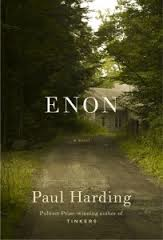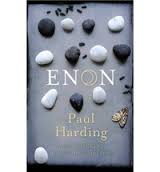 Enon by Paul Harding
Enon by Paul Harding
Expected Publication: September 10th, 2013 Random House
Dealing with grief is a difficult task, near impossible for some. For parents who have lost their child that task is even more than impossible. Harding has giving us a disturbing insight into the devastating process through his unnamed narrator in this emotional, but slow moving tale told from the perspective of a grieving father.
“Even if at any given moment it was no more than the hope for the return of hope, a single grain of it still contradicts a universe of despair.”
It’s hard to believe these words come out of the mouth of Harding’s narrator as you start the book. Distraught by the death of his daughter when she is hit by a car while riding her bike our narrator loses himself in his grief. Where his wife turns to her family for support and forces herself to continue living, the narrator turns to anger, drugs, and the dreams his near over-doses induce to stay connected with his daughter Kate.
This is not a “feel-good” or “how to move on” type book. It is real, raw, and sometimes uncomfortable. Our narrator is not a likable character. The further into the book you read the more difficult it is to empathize with him, and yet to not like him makes you feel guilty. His daughter just died. And now you know how it feels to be the people surrounding him during the grieving process. While not all parents become unable to live in the same way our narrator does after the death of Kate, his grieving process feels authentic because it feels individual. No one would grieve for Kate the same way as her father, and the more dependent on drugs he gets the more bizarre ways he pays tribute to his daughter become.

“I pushed deeper into the shade, further toward the border between this life and what lies outside it, and became something closer and closer to a corpse myself My hair was thin, my bones stuck out, and my skin stretched across my skull. I needed to be careful and not step over the boundary, because the thought that her own death caused her father’s suicide would be too awful for my daughter to bear.”
Harding takes us down into the narrator’s depression in a powerful way, and, honestly, sometimes it’s difficult to stay there. Harding has

“Houses retain traces of the people who have lived in them and I feel those traces immediately whenever I step into one”
Just like houses, traces of this book will remain with you even after you’ve finished the book. While not a plot driven novel, the literary merit of Harding’s style and the authentic way he conveys difficult emotions make this book a necessary edition to the literary works of the year.
I received an ARC of this book from the publisher.
 Enon by Paul Harding
Enon by Paul Harding